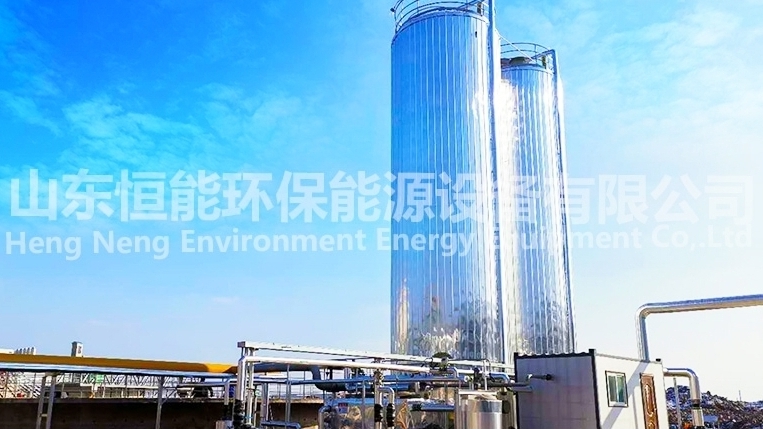歡迎進(jìn)入山東恒能環(huán)保能源設(shè)備有限公司
歡迎進(jìn)入山東恒能環(huán)保能源設(shè)備有限公司
一、沼氣提純的基本流程
1、 The basic process of biogas purification
我們先來快速了解一下從“原始沼氣”到“可用天然氣”的基本變化路徑:
Let's first quickly understand the basic transformation path from "raw biogas" to "usable natural gas":
原始沼氣的主要成分為50~70% CH?,30~50% CO?,少量H?S、H?O、NH?等雜質(zhì),主要目的為:獲取清潔甲烷
The main components of raw biogas are 50-70% CH? And 30-50% CO? A small amount of H? S, H? O、NH? The main purpose of impurities is to obtain clean methane
提純目標(biāo)階段的提取主要成分為CH? ≥ 95%,CO? ≤ 2%,H?S、H?O接近零,目的為:可替代天然氣使用
The main components extracted in the purification target stage are CH? ≥ 95%, CO? ≤ 2%, H?S、H? O is close to zero, with the purpose of being a substitute for natural gas use
二、沼氣提純中的難點(diǎn)與痛點(diǎn)
2、 Difficulties and pain points in biogas purification
我們可以從“技術(shù)瓶頸”“經(jīng)濟(jì)成本”“運(yùn)行穩(wěn)定性”“規(guī)模限制”等幾個(gè)關(guān)鍵維度逐一剖析:
We can analyze several key dimensions, such as "technological bottlenecks," "economic costs," "operational stability," and "scale limitations," one by one:
1. CO?的高效分離難
1. Difficulty in efficient separation of CO
原始沼氣中往往有30~50%的CO?,必須高效分離出來。
Raw biogas often contains 30-50% CO, which must be efficiently separated.
難點(diǎn)在于:CH?與CO?的分子大小、物理性質(zhì)相近,不容易用簡單物理方法分離。
The difficulty lies in the fact that CH? And CO? Have similar molecular sizes and physical properties, making it difficult to separate them using simple physical methods.
傳統(tǒng)水洗法雖然便宜,但效率低、能耗高,還會(huì)產(chǎn)生大量富CO?廢水。
Although the traditional water washing method is cheap, it has low efficiency, high energy consumption, and generates a large amount of CO rich wastewater.
本質(zhì)問題:分子分離的精細(xì)度要求高,但市場上廉價(jià)設(shè)備常常達(dá)不到理想效果。
Fundamental issue: The precision required for molecular separation is high, but cheap equipment on the market often fails to achieve ideal results.
2. H?S去除挑戰(zhàn)大
2. Removing H? S poses a great challenge
沼氣中H?S雖然含量低(幾十到幾百ppm),但其對設(shè)備腐蝕性極強(qiáng),而且在燃燒時(shí)會(huì)形成SO?污染空氣。
Although the content of H? S in biogas is low (tens to hundreds of ppm), it is highly corrosive to equipment and can form SO? During combustion, polluting the air.
需要精確控制H?S脫除精度(通常要小于5ppm),否則會(huì)損壞壓縮機(jī)、燃燒設(shè)備。
Accurate control of H2S removal accuracy is required (usually less than 5ppm), otherwise it may damage the compressor and combustion equipment.
工藝上常用氧化鐵吸附、活性炭、化學(xué)洗滌等方法,但都涉及吸附飽和、材料更換等問題。
Iron oxide adsorption, activated carbon, chemical washing and other methods are commonly used in the process, but they all involve issues such as adsorption saturation and material replacement.
本質(zhì)問題:H?S雖然量小但影響巨大,控制成本非常不成比例,殘留更會(huì)來帶更多的隱形使用成本。
Fundamental issue: Although the quantity of H-S is small, its impact is huge, and the cost control is very disproportionate. The residual will bring more hidden usage costs.
3. 系統(tǒng)集成與運(yùn)行穩(wěn)定性難
3. Difficulty in system integration and operational stability
提純系統(tǒng)需要多個(gè)模塊協(xié)同運(yùn)行(脫硫、脫水、除CO?、加壓、精脫等),系統(tǒng)一旦某一環(huán)節(jié)波動(dòng),整條線都要降負(fù)荷運(yùn)行。
The purification system requires multiple modules to operate in coordination (desulfurization, dehydration, CO removal, pressurization, refining, etc.). Once a certain link of the system fluctuates, the entire line needs to operate at reduced load.
特別是中小型項(xiàng)目,缺乏自控與遠(yuǎn)程監(jiān)控系統(tǒng),一旦停電、流量波動(dòng)、溫度變化都會(huì)帶來大問題。
Especially for small and medium-sized projects, the lack of self-control and remote monitoring systems can cause major problems in the event of power outages, flow fluctuations, and temperature changes.
本質(zhì)問題:運(yùn)營不穩(wěn)定導(dǎo)致產(chǎn)氣不連續(xù),影響商業(yè)模式與收益回報(bào)。
Fundamental issue: Unstable operation leads to discontinuous gas production, affecting business models and revenue returns.
4. 能耗與經(jīng)濟(jì)性差
4. Poor energy consumption and economy
不管是膜分離、水洗、PSA還是冷凝法,都需要一定的能耗(通常是壓縮、加熱、冷卻等過程)。
Whether it is membrane separation, water washing, PSA or condensation methods, they all require a certain amount of energy consumption (usually compression, heating, cooling, etc.).
沼氣項(xiàng)目多數(shù)是農(nóng)村分布式項(xiàng)目,缺乏低價(jià)電力支撐,運(yùn)營費(fèi)用高。
Most biogas projects are rural distributed projects that lack low-cost electricity support and have high operating costs.
本質(zhì)問題:能耗占總成本比例過高,導(dǎo)致利潤空間小。
The fundamental problem is that the proportion of energy consumption to total cost is too high, resulting in a small profit margin.
5. 規(guī)模經(jīng)濟(jì)效應(yīng)差
5. Poor economies of scale effects
沼氣本身的產(chǎn)生速率依賴于原料(糞便、秸稈、餐廚垃圾等)的數(shù)量與連續(xù)性,往往流量不穩(wěn)定且規(guī)模較小。
The production rate of biogas itself depends on the quantity and continuity of raw materials (feces, straw, kitchen waste, etc.), and the flow rate is often unstable and the scale is small.
而氣體分離提純技術(shù)往往是規(guī)模越大、單位成本越低,這與沼氣的“原生局限”產(chǎn)生沖突。
However, gas separation and purification technology often results in larger scale and lower unit cost, which conflicts with the "primary limitations" of biogas.
本質(zhì)問題:中小項(xiàng)目因規(guī)模太小、投資回報(bào)周期過長而缺乏吸引力。
The fundamental issue is that small and medium-sized projects lack attractiveness due to their small scale and long investment return cycles.
本文由 沼氣提純 友情奉獻(xiàn).更多有關(guān)的知識請點(diǎn)擊 http://www.huannengpower.com/ 真誠的態(tài)度.為您提供為全面的服務(wù).更多有關(guān)的知識我們將會(huì)陸續(xù)向大家奉獻(xiàn).敬請期待.
This article is a friendly contribution from biogas purification For more related knowledge, please click http://www.huannengpower.com/ Sincere attitude To provide you with comprehensive services We will gradually contribute more relevant knowledge to everyone Coming soon.
相關(guān)新聞